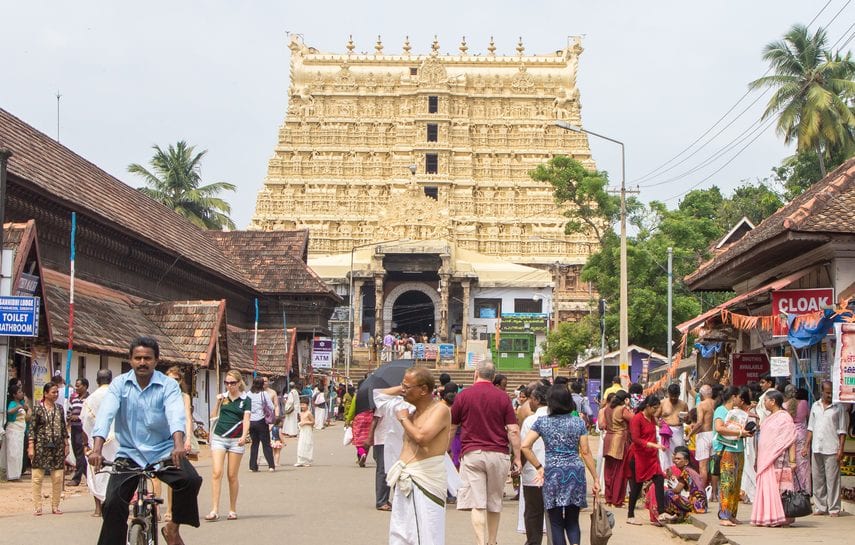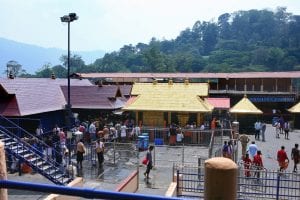
Allegations of mismanagement taint governing of Kerala temples
While the government does not officially govern temples, five socio-religious committees or Devaswoms (“Property of God”), tightly controlled by the ruling party, administer some 3,000 temples in the state and have been plagued by allegations of political interference, theft and sex scandals.

(Following the Supreme Court’s landmark Ayodhya verdict, the government is busy figuring out the contours of the Trust that will build the Ram temple. In this context, The Federal in a new series looks at how various states in the country have managed Hindu temples. We start with Kerala)
Three of India’s richest temples are located in Kerala, a magnet for politicians with an eye on the till. While the government does not officially govern temples, five socio-religious committees or Devaswoms (“Property of God”), tightly controlled by the ruling party, administer some 3,000 temples in the state and have been plagued by allegations of political interference, theft and sex scandals.
Officially, Kerala is home to some 30,000 temples, many of them tiny structures dedicated to Bhagavati, the most popular deity. They are usually owned by individuals or run by local communities on a shoestring budget. By contrast, the five Devasoms earn about ₹1,000 crore a year — five times the revenue of all the 42 state Public Sector Undertakings. Income from the large temples helps administer smaller ones under the control of each Devaswom.
Also read: Tirumala temple board packed with industrialists, politicians
The richest temple in India is the Padmanabhaswamy Temple in the state capital, Thiruvananthapuram. No one knows the extent of its wealth, but a Supreme Court-monitored audit of just one vault put it at about ₹1.2 lakh crore worth gold and diamonds. Their value is said to be about 10 times that figure if the antiquity of the ornaments is taken into consideration.
Of the six vaults in the temple, four contain silver and brass articles that are used in the daily rituals. While the court ordered the opening of Vault “A” — which was full of sacks of gold and diamonds — the priests have baulked at unsealing Vault “B”, which is said to contain nearly five times as many riches.
The wealth has been accumulated over centuries and the temple was governed till Independence by the royal family, which calls itself ‘dasa’ or devotee of Ananthapadmanabhaswamy, the presiding deity, who owns all the wealth. The Supreme Court is currently hearing a petition to appoint a broad-based committee instead of the erstwhile royal family of Travancore to manage the temple. The petition alleges large-scale mismanagement and possible theft of gold ornaments over the years.
Also read: LDF govt will not change its stand on Sabarimala: Pinarayi Vijayan
Simultaneously, the court is hearing a petition by Subramanian Swamy and TG Mohandas, seeking to wind up the five Devaswoms and end state control of Hindu temples. Christian and Muslim religious places were exempted from state control by British colonialists in the early 20th century following protests by the two communities. One of the provisions of the laws governing the Devaswoms requires an MLA — even a non-Hindu — to be a member of the committee. The petitioners contend that non-Hindu lawmakers often end up on the panel, jeopardising the interests of the Hindus.
Most of Kerala’s temples were owned by kings or royal families. After Independence, most of them came under the management of Devaswoms. The first government in Kerala led by Marxist leader EMS Namboodiripad and the one thereafter headed by Achutha Menon passed the Land Reform Act, which handed over thousands of acres of temple property to the cultivators, leaving the temples with little or no source of income. They were all subsequently brought under the control of the autonomous bodies.
Rahul Easwar, president of the Ayappa Dharma Sena, who was in the forefront of the agitation over the entry of women of menstruating age into the Sabarimala temple, alleges that both the Congress and the CPI(M), which have alternated in power, packed the Devaswoms with their appointees of select castes with an eye on their vote banks.
Also read: Centre should bring in law to protect faith of Sabarimala devotees: Kerala govt
The Supreme Court has often questioned government authorities over the administration of religious places in a secular democracy, suggesting that it be rather entrusted with the devotees. Yet, every government has resisted the move, claiming that it manages the temples better. Critics dare the government to try to take over churches and mosques.
All the Devaswoms have five to nine members each, comprising local citizens, priests and government appointees who must swear allegiance to the presiding deity even if they are non-Hindus or atheists. The properties are legally the personal property of the presiding deity of each temple. Activists say that a sizeable chunk of the income is spent on non-temple activities promoted by the government, such as free meals for the poor.
The richest is the Guruvayur Devaswom, which manages the Sri Krishna Temple in central Kerala, and has an annual income of about ₹400 crore in cash and gold. It is said to have ₹2,500 crore in assets, however, recent figures are not available.
Also read: Tirumala temple reveals gold reserves after row over seizure

A close second is the Travancore Devaswom, which manages some 1,240 temples in the state, with an annual income of about ₹390 crore. The richest temple under its management is the Sabarimala temple, which gets about ₹255 crore in donations from lakhs of black-robed devotees who throng the shrine every year from November to February. The income from Sabarimala, Chettikulangara Devi Temple and the Ettumanoor Siva Temple helps in the upkeep of the other shrines, most of which are poor.
The Malabar Devaswom Board manages the largest number of shrines — 1,337 — but earns only ₹80 crore a year from the temples located in the north-central portion of the state.
Media reports have frequently highlighted allegations of mismanagement in the Devaswom, mostly to the effect that the assets have never been verified or inspected.
(G Krishnan is a freelance journalist with 40 years’ experience writing and editing for Indian and American newspapers and news agencies)

